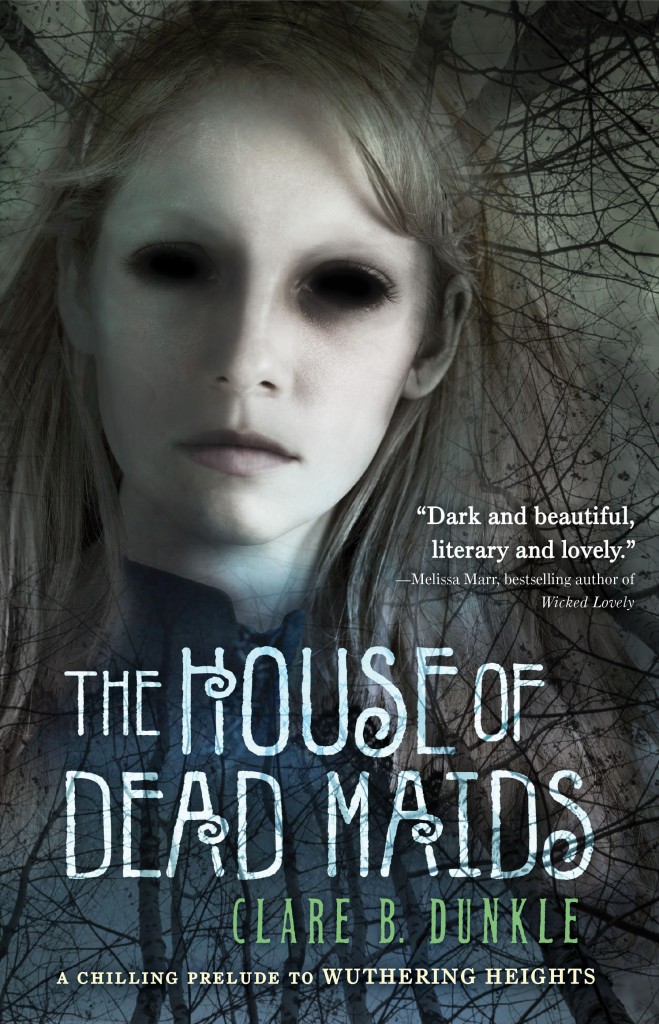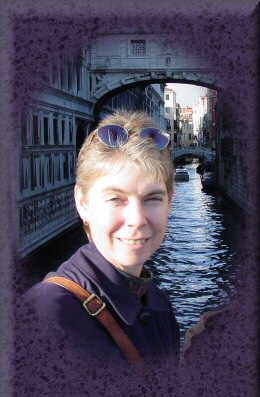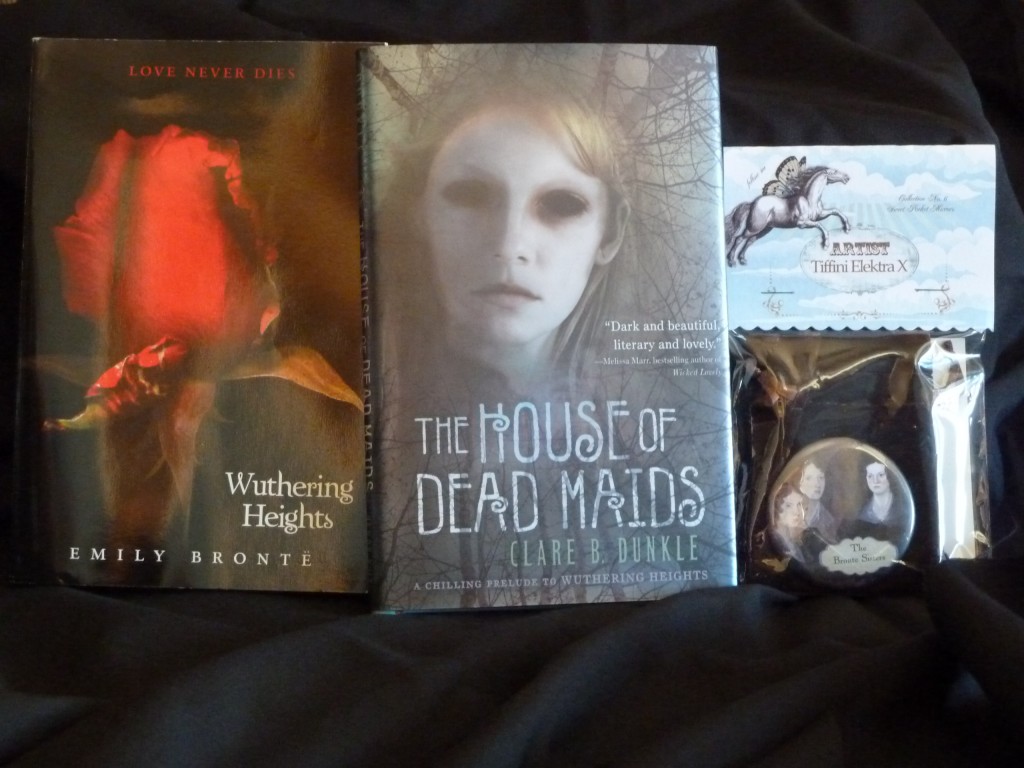I’m so excited! Clare B. Dunkle is visiting my blog as part of her Blog Tour in honor of her new book, The House of Dead Maids. And be sure to go all the way down to the end of the post for an awesome Giveaway!
 Here’s a link to my review of The House of Dead Maids. And below is our interview. I think you will find that Clare’s answers to my questions will make you eager to read the book!
Here’s a link to my review of The House of Dead Maids. And below is our interview. I think you will find that Clare’s answers to my questions will make you eager to read the book!
I’m so pleased to have you visit my blog for my first ever author interview! I think of you as a friend, since we met up a few times when we both lived in Germany, after I posted on your blog how much I loved The Hollow Kingdom. I’ve loved your other books over the years, too, so when I saw an Advanced Reader Copy of The House of Dead Maids at ALA in June, I snapped it up.
I’ll go a little off-topic for my first question. You lived in Germany 7 years and I lived there 10 years. What was your favorite thing about living in Germany?
 I think of you as a friend too, Sondy! As I recall, you attended my very first book signing. (I also recall that the bookstore somehow didn’t manage to have any copies of my book on hand—that put quite a damper on the happiness of the occasion.)
I think of you as a friend too, Sondy! As I recall, you attended my very first book signing. (I also recall that the bookstore somehow didn’t manage to have any copies of my book on hand—that put quite a damper on the happiness of the occasion.)
What was my favorite thing about living in Germany? Oh, there were so many! But best of all was the ability to travel a short distance and see picturesque and ancient things, like the Porta Nigra, just forty minutes from our doorstep, which the Romans had built eighteen hundred years ago.
(Fun! That’s almost exactly the same answer I would give to that question!)
One thing I love about your books is that they feel so much like historical fiction, it makes the reader believe these events really happened, including the fantastical ones. I don’t normally like ghost stories, but The House of Dead Maids felt so much like reading Jane Eyre, the ghosts just seemed like a natural part of the story. Tell us about the research you did for this book, and to get the voice just right (which you did!).
This manuscript came along at a very rough time in my life—real trouble in my family. I didn’t like to leave home much. I couldn’t even read cheerful books. But I did feel safe spending time with the Brontës because I knew they hadn’t had a perfect family, either, so I turned my attention to Wuthering Heights.
Now, you know how much trouble we had overseas getting our hands on the right research books. Our little base library could get materials only if they were held by another U.S. military base. But by sheerest good chance, I learned that we have a U.S. base in Yorkshire, and from that base I was able to get all kinds of fascinating research books: picture books about the Brontës, collections of Yorkshire folklore, critical readings of Wuthering Heights and Jane Eyre, volumes of Yorkshire history, even books about Yorkshire weather over the last several hundred years. I read them until Brontë and Yorkshire trivia just oozed out my pores. This gave me something to do other than hyperventilate (which is what I did whenever I stopped reading long enough to worry about my family). I was also reading books on pagan rituals at the time, and I reread Frazer’s Golden Bough, whose influence on my manuscript was considerable.
And of course we traveled to Yorkshire and got to visit all the right kinds of Elizabethan mansions and windswept moors. You can see pictures from that trip here on my website.
After I had a pretty good sense of my setting and of the ideas in my characters’ heads, I turned to the problem of narration. I tend to be one of those people who pick up accents without meaning to (and usually end up sounding pretty funny), so to prepare to write the narration, I read Jane Eyre, Wuthering Heights, and The Tenant of Wildfell Hall over and over to get the vocabulary and style down pat. I didn’t want to end up sounding like a Victorian; I wanted to end up sounding like a Brontë!
I’ve been reading your other blog tour posts, and one said that you began this book in 2005. Why is it being published so much later?
I finished the manuscript halfway through 2006, and it sold then, but I wound up having to buy this manuscript back from the publishing house that held it. I realized that it was misunderstood there and that if it got released, no one would ever hear a whisper about it.
So we got permission to shop it around again, and we took it to Holt, back to my beloved editor with whom I’d worked on the Hollow Kingdom Trilogy, and Holt bought it back for us. But then Holt had to make room for it on their calendar. It meant losing a couple of years.
I also understand that you have written a memoir with your daughter, and I believe you’ve also written library-related nonfiction. How is writing nonfiction different for you than writing fiction? How is your process different?
In fact, I did so much research on Wuthering Heights and on the Brontës that I wrote a ton of nonfiction connected with The House of Dead Maids. I found that I had a lot that I wanted to say about those subjects, and I didn’t want all that hard work to go to waste. You can find my essays about the Brontës on my website at this page. (The last time I printed all the Brontë stuff out, I think it came to about seventy pages, single-spaced.)
Writing this sort of research essay is like writing my library-related articles: it’s easier to do than writing fiction, but I have to marshal my facts first. I try to line up the facts I intend to cover and put the direct quotations I intend to use into the right order in my Word file. Then I try to write the text around those quotations. But in practice, that breaks down. I never seem to have every quotation I want in the right spot, so there’s a lot of breaking off and hunting up citations and quotations—big untidy piles of books with little Post-It flags sticking out of them, marked up printouts scattered around, that sort of thing.
Writing my daughter’s memoir has been different. That’s been more like writing fiction. It’s channeling characters, even if those characters are us. We’re going for emotional effect, of course, not dry facts. But the part of it that isn’t like writing anything I’ve done before, fiction or nonfiction, is the pain. You know that an author has to feel the pain of the characters in order for the reader to feel it too—now imagine writing your worst memories and nightmares down and being sure that you keep writing out all that pain. I won’t be sorry when revisions are over for this one.
Back when I talked to you in Germany, you didn’t read fiction while you were writing fiction. Has that changed? Read any good books lately?
I still tend to read more nonfiction than fiction, and my research tends to dictate my fiction list anyway. But I do read fiction nowadays, although I go on weird kicks. Earlier this year, I read as much Shirley Jackson as I could get my hands on, and We Have Always Lived in the Castle and The Sundial have become two of my favorite books. But lately I’ve been reading sea tales.
Don’t tell Amazon this, but I use the Calibre program to produce mobi files out of full-text Google books (those that are in the public domain, that is). Then I can read them easily on my Kindle DX, which I just adore. The last book I read this way was H.G. Wells’ quirky little tale, The Sea Lady, and I also recently read William McFee’s Casuals of the Sea, a rambling story from the 1910’s that more people should know. And of course I’m reading Joseph Conrad. I appreciate him more now than I did when he was assigned in school. I’m fascinated by the contrast he reveals between the simple, straightforward life of a man at sea and the enormous complications of life in a foreign port. It’s obvious that this was the bane of Conrad’s existence when he was a seaman.
Being an ex-librarian, I like free stuff, so I can’t resist mentioning a favorite source of audio recordings: http://www.librivox.org. That’s a volunteer-only site for public domain books on tape. I download them in mp3 format and then play them on my phone or mp3 player while I’m working out. I’m currently listening to the second of the two Treasure Island recordings, the one done by Dr. Adrian Praetzellis of Sonoma University. He’s a splendid narrator! A professional actor couldn’t do better. You can find a complete list of his librivox readings here.
I see that your publicity photo was taken in Venice. Do you have plans to write a book set in Venice?
I loved Venice, and I thought seriously about writing a story set in Italy, but ultimately, I decided against it, at least for the time being. I’ve been fascinated this year by Shirley Jackson and her ability to make a bland, familiar setting feel eerie and unsafe. It’s that juxtaposition of the known and the unknown that leaves readers looking over their shoulders. So I decided against Italy. It’s too exotic. Any creeps readers got from reading about it wouldn’t stay with them when they closed the book.
I’ve never read Wuthering Heights, but when I talked to you before this interview, you said it would be okay to read this book first, since it is a prequel. You also said you hoped your book would win new readers for Wuthering Heights, and I want to tell you that for this reader at least, you completely succeeded! I want to find out how these things play out in Heathcliff’s life!
Fantastic! That’s exactly why I wrote The House of Dead Maids. I hope you enjoy Wuthering Heights. Those first three chapters are so full of dark surprises and so splendidly written that I envy you getting to read them for the first time. Then you can consult my webpages about the book’s mysteries and motifs and see if you agree with what I’ve written there.
Clare, thanks so much for visiting my blog!
It was my pleasure. You were there at my first signing—now I’m here at your first author interview. Here’s to many more of both!
Readers, be sure to catch her next stop at tor.com! And meanwhile, here’s a fantastic giveaway in conjunction with the blog tour!
Special Brontë-themed giveaway!
One Grand Prize winner will receive The House of Dead Maids, a gorgeous Brontë sisters pocket mirror, and the HarperTeen edition of Wuthering Heights! Two lucky runners-up will receive the two books. To enter, send an email to DeadMaidsBook@gmail.com with your name, email address, and shipping address (if you’re under 13, submit a parent’s name and email address). One entry per person and prizes will only be shipped to US or Canadian addresses. Entries must be received by midnight (PDT) on October 31. Winners will be selected in a random drawing on November 1 and notified via email.
